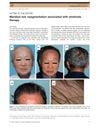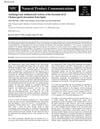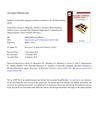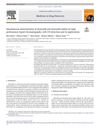 32 citations,
May 1995 in “Contact Dermatitis”
32 citations,
May 1995 in “Contact Dermatitis” Minoxidil can cause allergic reactions, but testing helps identify the cause.
 25 citations,
January 2011 in “Pharmacognosy magazine”
25 citations,
January 2011 in “Pharmacognosy magazine” Nardostachys jatamansi DC compounds help promote hair growth.
 19 citations,
July 1993 in “Journal of Applied Toxicology”
19 citations,
July 1993 in “Journal of Applied Toxicology” Different oil products cause varying levels of skin irritation in mice, which could potentially lead to tumors.
 14 citations,
June 2016 in “Pediatric Dermatology”
14 citations,
June 2016 in “Pediatric Dermatology” Some congenital hair disorders improve with age and can be managed with treatments like minoxidil, retinoids, supplements, and gentle hair care, but there's no cure.
 14 citations,
November 2006 in “Current Medicinal Chemistry”
14 citations,
November 2006 in “Current Medicinal Chemistry” New treatments for enlarged prostate are being developed to be more effective and have fewer side effects.
 12 citations,
March 2017 in “Medicinal Chemistry Research”
12 citations,
March 2017 in “Medicinal Chemistry Research” Some curcumin-like compounds can effectively and safely block the enzyme linked to hair loss and other conditions related to male hormones.
 9 citations,
April 2018 in “Journal of trace elements in medicine and biology”
9 citations,
April 2018 in “Journal of trace elements in medicine and biology” Hair analysis can show nutritional status and environmental exposure, with phosphorus being very stable in hair and differences found based on gender and conditions like depression and autism.
 9 citations,
July 2016 in “The Journal of Dermatology”
9 citations,
July 2016 in “The Journal of Dermatology” An 82-year-old man's white hair regained color after taking etretinate for psoriasis.
 9 citations,
October 2012 in “Natural Product Communications”
9 citations,
October 2012 in “Natural Product Communications” The essential oil from Chamaecyparis lawsoniana has strong antibacterial and antifungal effects, especially against yeast and Gram-positive bacteria.
 7 citations,
January 2015 in “Dermatology”
7 citations,
January 2015 in “Dermatology” Two gene variations, rs6493497 and rs7176005, may be linked to female hair loss in Chinese people.
 7 citations,
January 2009 in “Immunological investigations”
7 citations,
January 2009 in “Immunological investigations” A 3-year-old boy lost all his hair due to a rare reaction to phenobarbital, but it grew back after steroid treatment.
 6 citations,
February 2020 in “Journal of Natural Products”
6 citations,
February 2020 in “Journal of Natural Products” A new compound from a sponge strongly inhibits an enzyme linked to male-pattern hair loss without being toxic at low levels.
 6 citations,
January 2016 in “Bioorganic & Medicinal Chemistry Letters”
6 citations,
January 2016 in “Bioorganic & Medicinal Chemistry Letters” Some minoxidil combinations can help differentiate leukemia cells without harming other cells.
 5 citations,
May 2020 in “Diagnostics”
5 citations,
May 2020 in “Diagnostics” Lower zinc levels may predict less effective hair loss treatment.
 5 citations,
May 2019 in “Journal of oceanology and limnology (Online)”
5 citations,
May 2019 in “Journal of oceanology and limnology (Online)” Ecklonia cava extract can reduce the damage and stress caused by hair dye.
 4 citations,
May 2020 in “Medicine in Drug Discovery”
4 citations,
May 2020 in “Medicine in Drug Discovery” The study developed a method to detect minoxidil and its sulfate form, found that minoxidil sulfate is temperature-sensitive, and identified a way to potentially increase its stability for hair loss treatment.
 4 citations,
January 2018 in “Cosmetics”
4 citations,
January 2018 in “Cosmetics” Spin traps like PBN could protect skin from pollution and sunlight in cosmetics but need more research for safe use.
 3 citations,
November 2020 in “Biological Trace Element Research”
3 citations,
November 2020 in “Biological Trace Element Research” Men with hair loss may lack zinc, copper, and vitamin D; supplements could help.
 2 citations,
March 2021 in “Carpathian Journal of Food Science and Technology”
2 citations,
March 2021 in “Carpathian Journal of Food Science and Technology” Caraway, Chinese chives, and cassia may improve health and prevent diseases due to their nutrients and medicinal properties.
 1 citations,
March 2020 in “Current Science”
1 citations,
March 2020 in “Current Science” Most people in the surveyed area experience hair loss, but they are not aware of the role of diet, iron, hormones, genetics, and possibly water quality in causing it.
 1 citations,
July 2017 in “Journal of Pharmacognosy and Phytochemistry”
1 citations,
July 2017 in “Journal of Pharmacognosy and Phytochemistry” The study concluded that standardizing Thuja orientalis bark helps in its identification and quality control.
 1 citations,
January 2017 in “Organic chemistry”
1 citations,
January 2017 in “Organic chemistry” Tridax procumbens has medicinal properties like healing, pain relief, and infection control.

Curry leaves offer health benefits and can be used safely in various forms for digestion, diabetes control, and hair growth.
 March 2024 in “Tropical Journal of Natural Product Research”
March 2024 in “Tropical Journal of Natural Product Research” Many people in Fez-Meknes use potentially toxic plants for various health and cosmetic purposes, but more research is needed to ensure their safety.
 January 2024 in “Journal of Pharmacognosy and Phytochemistry”
January 2024 in “Journal of Pharmacognosy and Phytochemistry” Rosemary hair serum promotes healthier, stronger, and shinier hair.
 August 2023 in “The Indonesian Biomedical Journal”
August 2023 in “The Indonesian Biomedical Journal” Rosemary essential oil improved hair growth and thickness in UVB-exposed mice.
 April 2022 in “Journal of applied science and environmental management”
April 2022 in “Journal of applied science and environmental management” Alligator pepper seed extract improved wound healing in rats.
 January 2020 in “Cosmetics”
January 2020 in “Cosmetics” Ecklonia cava extract may protect the scalp from pollution and improve its health.
 April 2017 in “The journal of investigative dermatology/Journal of investigative dermatology”
April 2017 in “The journal of investigative dermatology/Journal of investigative dermatology” HSD11b1 affects skin nerves and increases non-histaminergic itch.
 January 2015 in “Springer eBooks”
January 2015 in “Springer eBooks” Some alternative treatments may help with hair loss, but more evidence is needed to confirm their effectiveness.






























